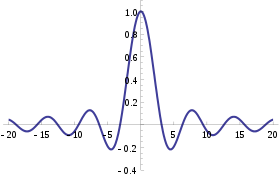
Back دالة مميزة (نظرية احتمالات) Arabic Характеристична функция Bulgarian Funció característica (teoria de la probabilitat) Catalan Charakteristická funkce (teorie pravděpodobnosti) Czech Charakteristische Funktion (Stochastik) German Karakteriza funkcio (probabloteorio) Esperanto Función característica Spanish Fonction caractéristique (probabilités) French Función característica Galician פונקציה אופיינית (הסתברות) HE

In probability theory and statistics, the characteristic function of any real-valued random variable completely defines its probability distribution. If a random variable admits a probability density function, then the characteristic function is the Fourier transform (with sign reversal) of the probability density function. Thus it provides an alternative route to analytical results compared with working directly with probability density functions or cumulative distribution functions. There are particularly simple results for the characteristic functions of distributions defined by the weighted sums of random variables.
In addition to univariate distributions, characteristic functions can be defined for vector- or matrix-valued random variables, and can also be extended to more generic cases.
The characteristic function always exists when treated as a function of a real-valued argument, unlike the moment-generating function. There are relations between the behavior of the characteristic function of a distribution and properties of the distribution, such as the existence of moments and the existence of a density function.
© MMXXIII Rich X Search. We shall prevail. All rights reserved. Rich X Search